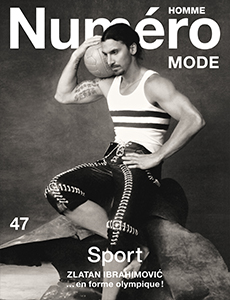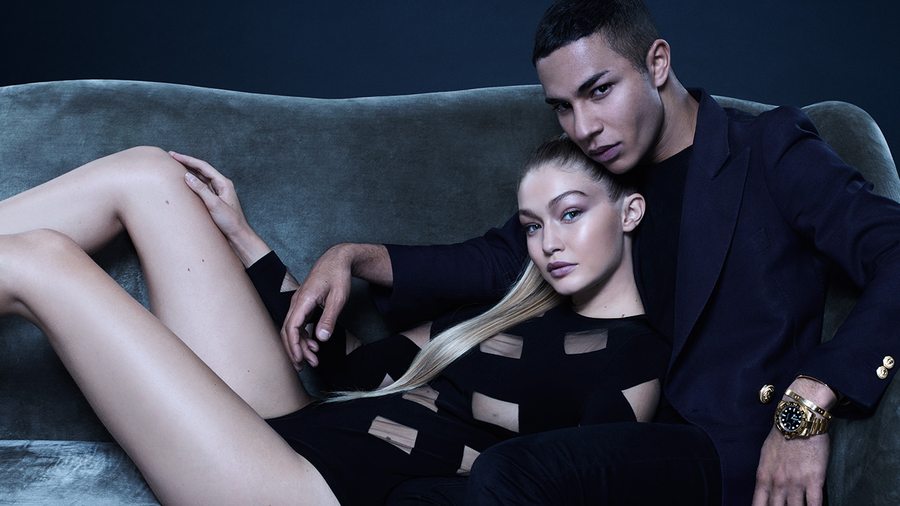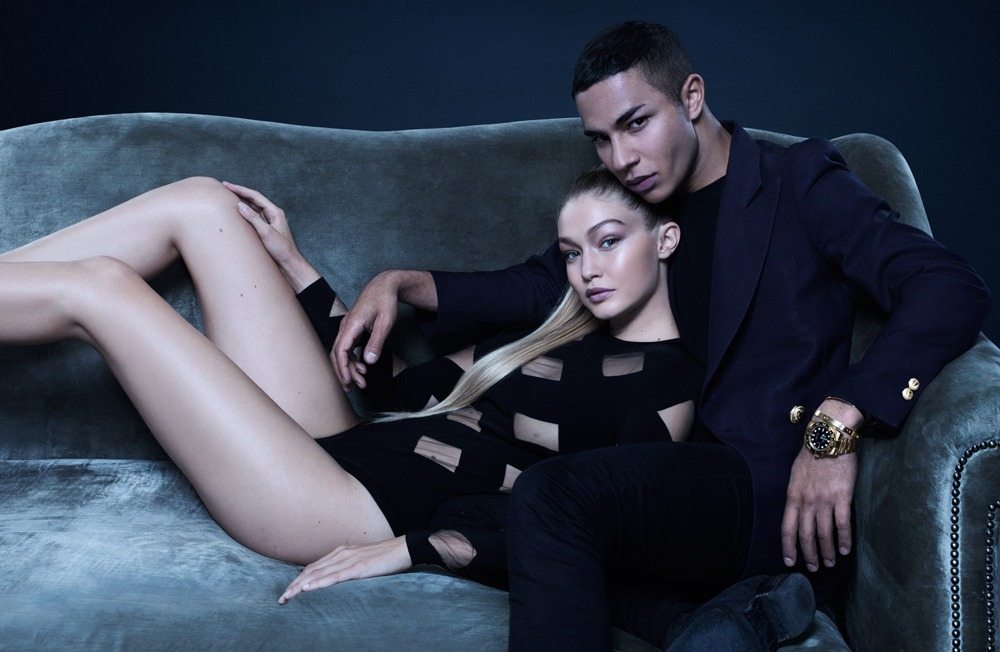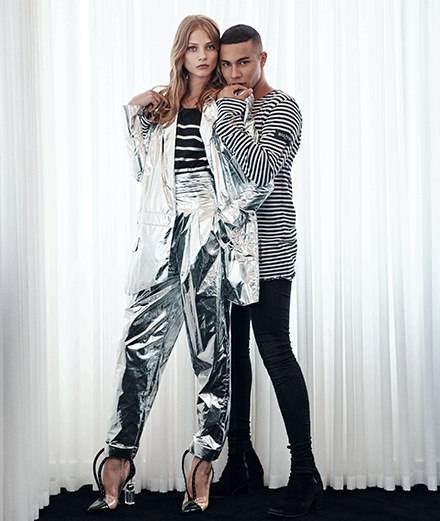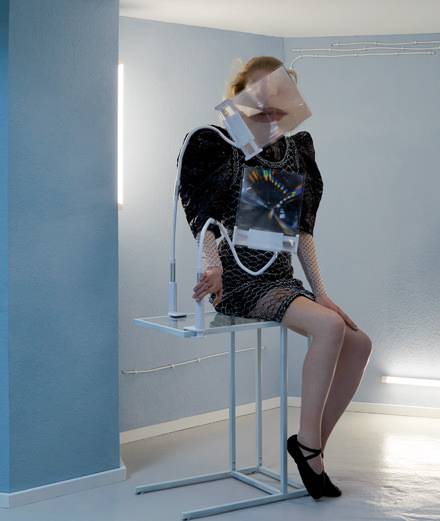Gigi Hadid et Olivier Rousteing par Jean-Baptiste Mondino
So where were you born, beautiful child?
In Bordeaux.
Were you an adorable little cherub or one of those unfortunate newborns with cradle cap and hair on their chins?
I was adorable. Ah no, now I think about it, I was fat. But I lost it very quickly.
What did your mother do?
She was an ophthalmologist.
Meaning? She sold designer glasses at an optician’s?
She did indeed work in a shop where she sold glasses, but she treated people too.
And your father?
He was director of the port in Bordeaux.
Which is to say?
He oversaw everything that was to do with the technical aspects of ships. He checked cruise liners and things like that.
Ah. And when did you decide it was time to set sail?
I stayed in Bordeaux until I was 16, when I left in search of globe-trotting, diversity and a bit of extra general culture. I wanted to discover the world. I also needed to broaden my mind – after all Bordeaux is a very conservative city.
At school were you more a dunce or a swot?
I was excellent, always top of the class. I usually got 19 out of 20.
A real prodigy.
I passed my baccalauréat a year early with a distinction.
Did you have a lot of friends at the time, or were you a pariah in the playground?
At primary school I was quite popular – I was the “puppy” everyone liked and thought was cute. In secondary school I was hated by everyone, but at sixth-form college I was a leader.
What did you do to make everyone hate you at secondary school?
Nothing, except being different from everyone else at an age when kids don’t understand.
Different in what way?
Different because I was into fashion, different because I had particular tastes… I wouldn’t go so far as to say I was more feminine than my classmates, but I liked to look after my appearance, and I always wore the latest fashionable brands. I must have come across as a bit of a spoilt child, and the other kids were probably jealous. What’s funny is that a number of them now send me private messages on Instagram telling me they adore me. Revenge is a dish best served cold…
When did you first realize you…
…would go into fashion?
No.
Are you talking about love?
Yes, the one that dare not speak its name.
I discovered I was gay at the age of 15. It was during my last football match, when I was watching the half-naked boys more than the ball.
Do you have siblings?
No, I’m an only child. Adopted. My biological parents abandoned me and I was in an orphanage until I was one and a half.
Have you ever met your biological parents?
No.
Do you know who they are?
No, I was born anonymously. I’ve no way of contacting them, even if I wanted to.
How did your parents react when at 16 you told them you were leaving home?
My father was against it, my mother supported me. My parents wanted me to be an attorney in international law. In the end I opted for the international part, but not in law. I went up to Paris where I fell on my feet pretty easily – my parents supported me financially and I’ve a lot of family in the capital. So a lot of people were looking out for me. My biggest shock was moving to Italy: my parents stopped supporting me, and I had to do internships and dance in clubs in order to survive.
I don’t know which is worse...
When I danced in clubs, I was dressed, let me be clear. It was a funny experience because I was working at Roberto Cavalli’s at the time and I had fittings with [the designer] Peter Dundas until one in the morning before having to run off and change and go to the nightclub with my clothes in a bag to earn e150 a week. Which is how I paid the rent. I danced on a podium, and sometimes people would come and stub out their cigarettes on my thigh.
While all you wanted was a cheque slipped into your underwear.
It wasn’t Le Dépôt either, I wouldn’t have gone that far! To do it well, you need self confidence and you have to be able to dance well and play a role.
And what role were you playing exactly?
A boy who loved fashion and who wore vintage Miami Vice-style Versace shirts that gave him a little 90s hip-hop air. I’m not going to tell you what the club was called, otherwise you’ll find pictures. So basically I was working at the same time at Cavalli where I showed the whole team that I had ambition to spare and that I was ready to stay up night after night to work. One thing led to another, and I rose up the ranks from lowly intern to Peter Dundas’s right-hand man. When Peter left Cavalli to join Ungaro, I stayed on and ended up working on the runway shows in close collaboration with Eva and Roberto Cavalli. While I learned a lot in technical terms with them, there came a moment when I felt the need to go my own way as a designer in order to express my own desires and my own taste – to be the one who made the decisions rather than taking orders. That’s why I came back to Paris.
Had you already signed up with Balmain when you left Cavalli?
Yes. I was still at Cavalli when I sent my C.V. to Balmain, who asked to see me straight away. Christophe [Decarnin, the then artistic director at Balmain] liked my work, so I spent a year and a half with him as studio director. It was a weird experience because I was still very young and most of the interns were my age, although technically I was their boss.
How was your time with Christophe Decarnin?
It was very interesting to the extent that his taste was very similar to mine, without being exactly identical. He was more rock ’n’ roll, more Kate Moss, while I was more hip-hop, more Rihanna. He was introverted, whereas I’m extroverted. We were very complementary, a bit like fire and water. Afterwards, he distanced himself from the brand, which helped me rise. And I thank him for it from the bottom of my heart.
Why do you think he distanced himself?
When you’re not having fun anymore – in fashion or anywhere else – you get bored. And I think that Christophe was bored at Balmain. He probably felt he’d done all there was to do, and reckoned it was time to go. Sometimes it’s better to leave at the right moment, holding your head up high, rather than staying on too long with nothing more to say.
Would you leave Balmain were Bernard Arnault or François-Henri Pinault to hold out the carrot?
While it’s true that I feel a certain loyalty to Balmain, it must be said that at the beginning I was the baby there, whereas now Balmain is my baby. There’s been a shift, a transition, and the roles have switched. I’ve proven my worth, the sales are there, the house has grown enormously… So it’s no longer a question of loyalty but of wellbeing. I’m not going to tell you which brand or house I’d like to work with. That’s not the problem. All I want is to be as happy in five or ten years as I am now, which isn’t necessarily linked to a name, a brand or an empire. As things stand, I feel very good at Balmain. But hey, you really never know how things might turn out tomorrow.
How do you explain this “switching of roles” at Balmain?
I didn’t have this feeling of power after my first runway show. I’d had to work so hard to prove my worth to everyone that, even if on paper I had full powers, I wasn’t ready to feel it in my head. At Balmain I really came into my own for the very first time with my African show, because the house had evolved, new people had arrived, and others had left. I had to wait till then to be able to express my vision.
Were you allowed to change the teams when you took over at Balmain?
Yes, but it’s like everywhere: there are pillars that resist and are impossible to move, and then there are others that fall all by themselves.
How old were you when you fell in love for the first time?
I’ve never been in love.
What?! How come?
No. By the way, my mobile number is 06… [Laughs.]
